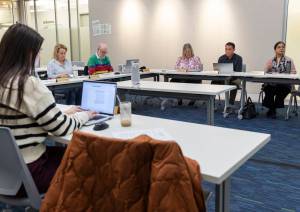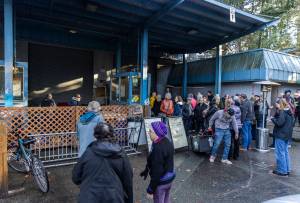Sewer rates to rise as Everett upgrades antiquated system
Published 9:18 pm Monday, February 3, 2014
EVERETT — If time or money were no object, it would be an easy decision to replace all of the city’s antiquated sewer infrastructure.
Unfortunately, separating sewer and stormwater pipes citywide would cost an estimated $1 billion and take 30 years to complete. To pay for that work, sewer bills would eventually rise to about $250 per month.
Given those numbers, the city is likely to shy away from a comprehensive overhaul of outdated sewer systems built between the 1890s and the 1960s. While not as expensive, other alternatives for the work won’t be cheap either.
Determining the best path forward will be a matter of debate between now and springtime, when the City Council is set to pass a 10-year sewer-infrastructure plan.
While sticker shock is hard to deny in the short term, city leaders also will take a long view of the situation.
“We need to make sure we’re doing the right job at the right price,” Councilwoman Brenda Stonecipher said. “We certainly don’t want to be cheap about it and wish we made a better investment.”
Updating Everett’s sewers has acquired a new urgency since intense storms in late August and early September caused extensive basement flooding.
To date, the city has fielded 194 damage claims from those storms, totalling more than $4 million. Claims for damage at Snohomish County Public Utility District and Everett Community College buildings are a big factor driving up the latest estimates.
Everett’s sewer problems owe to the systems in older parts of town, where stormwater and sewage flow through the same pipes. With normal rainfall, the combined flow goes to the city treatment plant and then into Possession Sound. When wet weather maxes out the system, however, untreated water spills directly into the sound.
A public works presentation at last week’s City Council meeting gave a first look at the city’s options for separating the systems.
Factors to consider include the effect on utility bills, safeguarding public health and lowering maintenance costs. In last week’s presentation to the City Council, public works director Dave Davis underscored the rarity of the Aug. 29 storm, which for several minutes dumped rain at a rate of about 2.8 inches per hour. It was the most intense rainstorm to hit Everett since the city began keeping records in the 1940s. The next worst storm hit in June 2010 and resulted in about a $1 million in damage claims.
Davis outlined three main options for how to go about the upgrades and recommended a variant of the option with the lowest price tag.
The least-expensive proposal would cost an estimated $283 million over a decade. It would be designed to guard against moderate to heavy storms, but not the most intense ones.
It would cause sewer rates to roughly double to about $100 per month over the next decade, compared with about $70 at the current rate of increase.
For now, Everett has one of the lowest water and sewer rates among Washington’s larger cities, at about $49 per month. Seattle ratepayers pay nearly 2.5 times that.
Under the least-expensive option, the bulk of the money — $231 million — is for improvements that already factor into the city’s long-term planning. It’s going for required upgrades to replace failing infrastructure and to comply with new regulations.
Another $45 million, under the plan, would upgrade sewer systems to accommodate greater stormwater runoff.
The plan would emphasize installing backwater valve installations on a house-by-house basis where basements are most at risk of flooding. The city estimates that more than 3,600 homes in the combined sewer area have basements and about half of them are susceptible to flooding.
“People are taking basements that were originally constructed for storage and they’re being upgraded as living space,” Davis said.
Backwater valves essentially add an extra section of pipe with a flap that only allows water to flow in one direction. That lets sewage flow away from a home, but not into it. The valves can malfunction if not maintained regularly. Using the shower or flushing a toilet during a storm also can push them open, making them ineffective.
Of the 107 backwater valves installed between storms in June 2010 and last September, Davis said only about 10 percent of them failed.
Since September, 42 backwater valves have been installed or are under contract to be installed. Another 24 are in a bidding process. The city is paying for the installations, often as a condition of a claim settlement. The average installation cost is about $2,500 each.
The city also hopes to work on other smaller-scale drainage improvements, such as rain gardens and rain barrels. It also wants to work with north Everett businesses to install better stormwater detention facilities on their properties.
The next-most expensive option for updating the city sewers would cost $480 million and take 20 years. It would push sewer rates to around $110 per month after 10 years and about $150 per month thereafter.
The option would be designed to withstand intense storms, but would not separate all systems in combined sewer areas.
The most-expensive option would cost a little over $1 billion and take three decades to build. Monthly sewer rates could exceed $125 after 10 years and could reach $250 after 30 years.
The top-dollar plan would rebuild infrastructure to fully separate systems for sewage and storm runoff in all areas now served by a combined system.
The new system would be designed to withstand a storm only slightly weaker than the Aug. 29 deluge.
The high-dollar option also would treat all stormwater, something that’s not required now, but is likely to be at some point.
The city paid about $26.6 million in sewage expenses in 2013. The biggest chunk, 38 percent, was to build infrastructure. The next largest was 21 percent for labor, followed by 17 percent for operations and maintenance. Sewer claims were projected to eat up 13 percent of the budget.
Noah Haglund: 425-339-3465, nhaglund@heraldnet.com.




